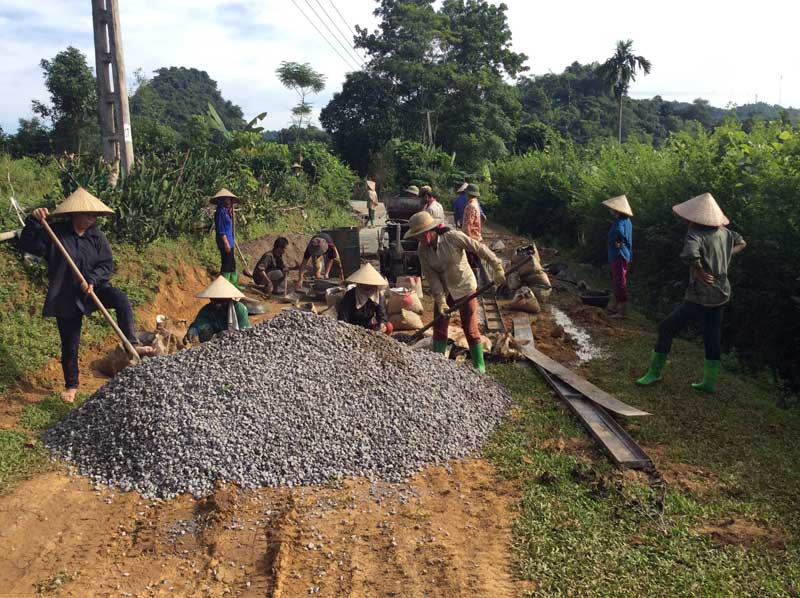
(HBO) – Preserving traditional cultural values has formed the basic foundation for Dich Giao commune, a locality inhabited by Muong ethnic people and located in the centre of Muong Bi region, to successfully develop a standout new style rural area model in Tan Lac district.
Dich Giao commune was recognised as a new style rural area in June 2015. Local
Party, authorities and people have continued their efforts to mobilise social
resources to improve its realised criteria. The commune has upgraded and
expanded many rural roads in accordance with set criteria. Roads running
through Khang, Sung 2 and Sung 3 hamlets were enlarged to 3.5 metres in width.

Photo:
Locals in Khang hamlet, Dich Giao commune involve in road construction
The commune has paid due attention to ensuring rural environment. Along
with signing commitments with the authorities to protect the environment in
production and breeding, local people have maintained road clean-ups to ensure
public health. Responsibilities of local individuals are concretised in each
hamlet’s regulations. Accordingly, local residents voluntarily clean up rural
roads in every Saturday.
Bui Van Dinh, Chairman of the Dich Giao commune People’s Committee, said: "The
commune’s success in implementing the national programme on building new style
rural areas is spurred by the consensus of local officials and Party members
who have set good examples and played pioneering roles in the mission”.
Notably, Dich Giao has prioritised the preservation of traditional cultural
values. Despite the changing life, it is still common to see traditional
costumes to be worn by local people or hear stories and greetings in ethnic
languages. It becomes the ideology of local people in the new style area
building process.
During the construction of rural infrastructure, more than 700 households
donated their lands. Among families giving hundreds of metres of land are Bui
Van Hau’s family in La hamlet and Bui Thi Thoan’s family in Sung 1 hamlet.
Currently, 11 out of 14 hamlets in the commune are cultural villages and more
than 85 percent of households are recognised as cultural families./.
Following the direction of the Vietnam Women's Union (VWU) Central Committee, the Hoa Binh provincial Women's Union has proactively and extensively implemented the "Godmother" programme with various practical and creative solutions to support and care for children who become orphans due to the COVID-19 pandemic and other causes. As many as 448 children have received both material and spiritual assistance in the 2021–2025 period.
More than just an information technology teacher, Bui Van Nien is an inspiring figure who has nurtured the scientific curiosity and creative spirit of students in Vietnam’s ethnic minority communities.
Da Bac is the most disadvantaged mountainous district in Hoa Binh province, with ethnic minorities accounting for about 90% of its population. Over the past years, the district has mobilised resources to implement ethnic policies to improve the quality of life of local people.
In recent years, Hoa Binh province has consistently prioritised the protection, care, and education of children, particularly those from ethnic minorities and disadvantaged backgrounds, by creating a safe, healthy, and nurturing environment for their all-round development.
The Steering Committee for Tobacco Harm Prevention and Control of Hoa Binh province, in coordination with the Tobacco Harm Prevention and Control Fund, held a ceremony on May 28 in response to the World No Tobacco Day (May 31) and the National No Tobacco Week (from May 25 to 31). The event was chaired by Nguyen Van Toan, Standing Vice Chairman of the provincial People’s Committee and head of the Steering Committee.
Since 2021, the Center for Industrial Promotion and Industrial Development Consulting (CIIDC) under the Department of Industry and Trade has been implementing a school lighting model as part of the plan for using energy efficiently and economically in Hoa Binh Province in the pẻiod of 2021 - 2025. This model not only aims to improve the learning conditions and enhance the education quality, but it also promotes the message of energy saving, energy security, environmental protection and contributes to the goals of socio-economic development.



